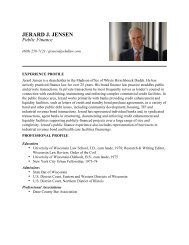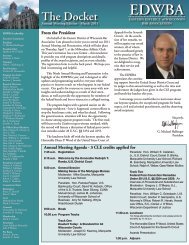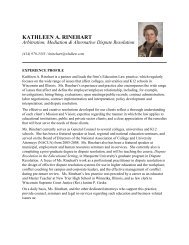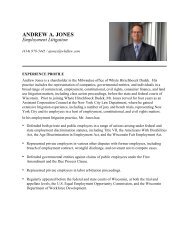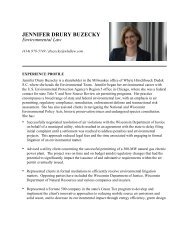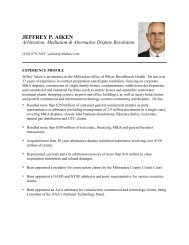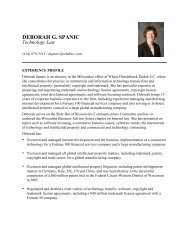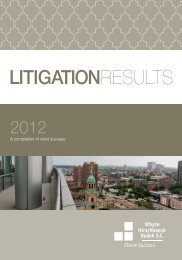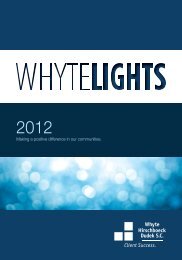FORETHOUGHT - Whyte Hirschboeck Dudek SC
FORETHOUGHT - Whyte Hirschboeck Dudek SC
FORETHOUGHT - Whyte Hirschboeck Dudek SC
You also want an ePaper? Increase the reach of your titles
YUMPU automatically turns print PDFs into web optimized ePapers that Google loves.
DEFERRED ACTION FOR<br />
CHILDHOOD ARRIVALS: WHAT<br />
EMPLOYERS NEED TO KNOW<br />
Written by<br />
Tiffany L. Hutchens<br />
The Obama administration’s deferred<br />
action for childhood arrivals (DACA)<br />
program could grant a path for more<br />
than 1 million unauthorized immigrants<br />
to legally join the workforce. However,<br />
employers who know that an employee<br />
is applying for DACA relief may be at risk<br />
of violating federal immigration law. These<br />
risks may be mitigated by formalizing the<br />
employment verification letter request<br />
process. This will limit an employer’s<br />
knowledge that an employee is currently<br />
unauthorized and applying for DACA relief.<br />
What is DACA<br />
DACA provides temporary relief from<br />
possible deportation and allows successful<br />
applicants to obtain employment<br />
authorization. DACA applicants, by their<br />
very nature, are not legally authorized to<br />
work in the United States. Immigrants who<br />
came to the United States as children and<br />
meet the following requirements may be<br />
eligible for DACA relief:<br />
1. Came to the United States before<br />
turning 16 years of age;<br />
2. Demonstrate at least five years<br />
of continuous presence as of<br />
June 15, 2012;<br />
3. Are under 31 years of age;<br />
4. Are enrolled in school, have either<br />
graduated from high school, passed a<br />
GED test, or served honorably in the<br />
armed forces of the United States; and<br />
5. Do not have any serious criminal history.<br />
Applicants are required to prove these five<br />
elements with supporting documentation.<br />
Employment verification letters or paystubs<br />
may be requested by applicants to<br />
demonstrate the second element—that<br />
they have been in the United States for five<br />
continuous years prior to June 15, 2012.<br />
What are an Employer’s Risks<br />
Federal immigration law prohibits<br />
employers from knowingly hiring someone<br />
who is not authorized to work. Civil and<br />
criminal liability may attach to an employer<br />
who knowingly employs unauthorized<br />
workers. An employer’s “knowledge” may<br />
be actual or constructive, and in the DACA<br />
context, it will attach when an employee<br />
asks an employer about how to apply<br />
for the DACA program or requests proof<br />
of employment for DACA purposes. It is<br />
important to note that not every request<br />
for an employment verification letter<br />
implicates immigration law. There are<br />
many reasons why someone may need<br />
to verify employment with an employer,<br />
and a simple request for confirmation of<br />
employment dates with no mention of the<br />
DACA program should not raise a red flag<br />
for employers. Furthermore, employers<br />
should not rush to judgment regarding<br />
an individual’s immigration status if talk<br />
of DACA is heard around the workplace.<br />
However, if an individual specifically<br />
requests employment verification for<br />
DACA purposes, an employer is deemed<br />
to have knowledge that the individual is<br />
not work authorized.<br />
While many employers may be compelled<br />
to help an employee gain temporary<br />
relief from deportation and lawfully join<br />
the workforce, the knowledge gained<br />
regarding an employee’s illegal status<br />
exposes the employer to potential liability<br />
for the employment of unauthorized<br />
workers. Employers who know that a<br />
current employee is applying for DACA<br />
relief because he or she is not authorized<br />
to work in the United States will have<br />
to fire the employee or face liability for<br />
violating immigration laws.<br />
HUMAN RESOURCES 23



